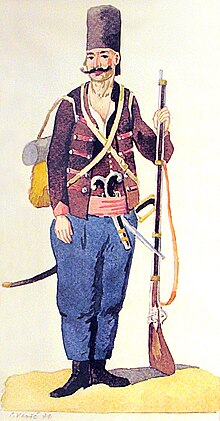Serbian Free Corps
| Serbian Free Corps | |
|---|---|

Illustration of a volunteer
|
|
| Active | 1787 — 1792 |
| Country |
|
| Allegiance | Habsburg Monarchy |
| Role | Serbian liberation and unification with the Habsburg Monarchy |
| Size | 5–8,000 |
| Garrison/HQ | In Banat Military Frontier |
| Nickname(s) | frajkori |
| Engagements | |
| Disbanded | 1792 (Treaty of Sistova) |
| Commanders | |
| Main commander | Mihailo Mihaljević, major |
| Notable commanders |
Koča Anđelković Stanko Arambašić and Radič Petrović |
The Serbian Free Corps (German: Serbische Freikorps), known simply as frajkori (Serbian Cyrillic: фрајкори), was a volunteer militia composed of ethnic Serbs, established by the Habsburg Monarchy, to fight the Ottoman Empire during the Austro-Turkish War (1787–91). The conflict with Turkish forces ultimately proved inconclusive. The rebellion in the Sanjak of Smederevo and militia's operations resulted in the period of Habsburg-occupied Serbia, which took place from 1788 to 1792. Ultimately, the Serbian volunteer corps had the legacy of promoting the creation of future paramilitaries, such as during the First Serbian Uprising.
A Serbian freikorps of 5,000 soldiers had been established in Banat (Banat Military Frontier), composed of refugees that had fled earlier conflicts in the Ottoman Empire. The Corps would fight for liberation of Serbia and unification under Habsburg rule. The main commander was the Austrian major Mihailo Mihaljević. There were several freikorps along the Habsburg-Ottoman frontier. Mihaljević's Free Corps, the most notable, was active from Šumadija to Podrinje, and across the Morava there was the Braničevo Free Corps; in Croatia the St. George Free Corps; in Bosnia they were called Seressaner. Other Serb militias were the Kozara Militia and Prosar Militia, established in Bosnia in 1788, composed of 1,000 soldiers each.
...
Wikipedia
